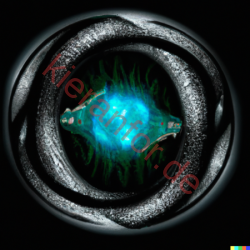Sacasas, L. M. (2024, November 27). The Enclosure of the Human Psyche. The Convivial Society, (5)13. https://theconvivialsociety.substack.com/p/the-enclosure-of-the-human-psyche
Header image: ﻼF in Dall-E
[HHH idea…]
- That the internet is reading our minds conjures an amorphous, quasi-mystical phenomenon about which there would be little we could do. Consider instead that we are suffering through a process that has a concrete, historical precedent, one that we might describe as the enclosure of the human psyche.
- “Silence as a Commons,” Ivan Illich described the commons this way: “People called commons that part of the environment which lay beyond their own thresholds and outside of their own possessions, to which, however, they had recognized claims of usage, not to produce commodities but to provide for the subsistence of their households.”
- Gleaning became trespassing, and fishing became poaching
- McLuhan:“Once we have surrendered our senses and nervous systems to the private manipulation of those who would try to benefit from taking a lease on our eyes and ears and nerves, we don’t really have any rights left.”
- Ivan Illich: “I would like to get … people to think about what tools do to our perception rather than what we can do with them … how their use shapes our perception of reality, rather than how we shape reality by applying or using them.”
- The senses are the gateway to the psyche. To enclose the psyche, it would be necessary to enclose the senses first. So, in this case, the fences and hedgerows become the devices that channel, direct, and colonize our perception of the world [screens].
- So far, I’ve been mostly interested in analogizing certain developments in digitized society to the process (and motives) of enclosure. But it’s also worth considering whether the analogy to the commons can tell us something about the human psyche. Illich gives us a clue: silence.
- When the enclosure of the psyche is complete, we lose the right to wander and roam and loaf about in thought, just as the enclosure of the commons restricted freedom of movement and disdained economically unproductive but life-affirming forms of leisure. And we lose ourselves, too. For as Illich observed, “silence, according to western and eastern tradition alike, is necessary for the emergence of persons.”.. “It is taken from us by machines that ape people. We could easily be made increasingly dependent on machines for speaking and for thinking, as we are already dependent on machines for moving.”
- Several years ago, Matthew Crawford argued along similar lines. “Lately, our self-appointed disrupters have opened up a new frontier of capitalism,” Crawford wrote, “complete with its own frontier ethic: to boldly dig up and monetize every bit of private head space by appropriating our collective attention. In the process, we’ve sacrificed silence — the condition of not being addressed.” “And just as clean air makes it possible to breathe,” Crawford added, “silence makes it possible to think.”
- In Crawford’s framing, the commons is an environment that makes thought possible. In my analogy, the mind itself is the commons to be protected against enclosure, the built environment is the means of enclosure…. we should resist framing our attention as a resource
(Jan 21, 2025) Audrey Watters. AI Foreclosure.
https://2ndbreakfast.audreywatters.com/ai-foreclosure/?ref=second-breakfast-newsletter
- Education is a liminal space – one of becoming.
- Liminal spaces are, as the anthropologist Victor Turner argued, “betwixt and between.”
- [bias and limited dataset]
Takeaway #3: Your data is you.
A central theme of Project Liberty’s Summit was the role of data in empowering individuals to reclaim control over their digital identities. Audrey Tang, Taiwan’s Cyber Ambassador-at-Large,and an advisor to Project Liberty Institute, spoke about “selective disclosure” technology, or tools that allow people to disclose just a part of their identity on the web. “The great hope is to think of this as public infrastructure,” Tang said, where open-source technologies can be adopted by other countries and jurisdictions.
We’re in the midst of a renaissance of tech innovations around data ownership: from Project Liberty’s Frequency blockchain to new models like data commons and data trusts. Sylvie Delacroix, the Inaugural Jeff Price Chair in Digital Law at King’s College London, presented her work to launch the first data trust pilot worldwide in 2022 through the Data Trusts initiative. Matthew Prewitt, the President of the RadicalxChange Foundation, highlighted their work with Serpentine around Partial Common Ownership of art, as a new model for collective ownership of digital assets.

